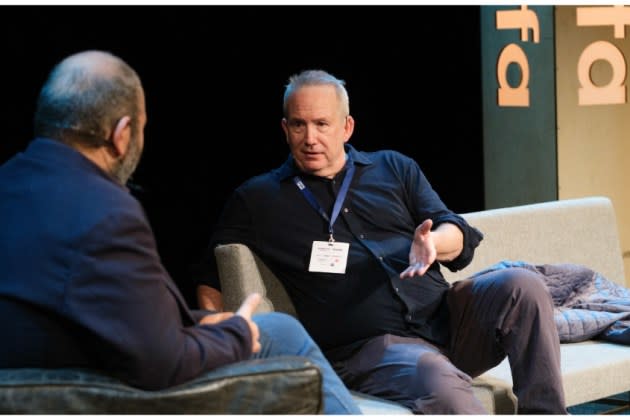Producer Ted Hope Discusses Decades-Long Career, Equal Representation and Impending ‘Blooming of Expression’
- Oops!Something went wrong.Please try again later.
- Oops!Something went wrong.Please try again later.

As part of this year’s industry program at the International Documentary Film Festival Amsterdam (IDFA), producer Ted Hope sat down with the festival’s artistic director Orwa Nyrabia for an in-depth conversation about his career in U.S. independent film, the future of the industry, and the ways in which filmmakers and audiences are “trained by major players to adapt and conform to a creative process that colors only between the lines.”
Hope, who is at IDFA to support Vanessa Hope’s “Invisible Nation,” has navigated the independent filmmaking scene since the late 80s. The executive has produced over 70 films including Todd Solondz’s “Happiness” and, most recently, Roger Ross William’s fiction debut, “Cassandro.” From 2014 to 2020, Hope headed Amazon’s Original Movies.
More from Variety
Roco Films and Gathr Launch Documentary Speakers Bureau (EXCLUSIVE)
'Life Is Beautiful' Review: An Upbeat Self-Portrait of a Palestinian Stranded in the Far North
“I spent most of my life looking for a mentor or father figure and found virtually none, and as a result wanted to give people what I longed for,” said Hope of his initial motivations for entering the industry. The producer, who lost his father at a young age, credits his mother’s love of cinema as a massive influence in his own cinephilia, lovingly reminiscing about watching films by Charlie Chaplin and Buster Keaton as a child. His adolescence at a boarding school introduced the future producer to Stanley Kubrick and Martin Scorsese, further fuelling a passion that would lead him to sign up for film studies at New York University, where he would meet fellow budding producers James Schamus and Christine Vachon.
The timing of Hope’s studies at NYU coincided with the VHS boom. “When new technology arrived, video distributors popped up making movies for a low price, and that gave birth to the second or third wave of American independent cinema,” he said. “If you could deliver something for under three million dollars, you were allowed to get movies made. That recognition that the business system we’re in dictates a certain product made me want to figure out: how can I do that? I didn’t think I could get the 2 or 3 million, so my friends and I set out to learn how to make movies for half a million dollars, and it worked for us.”
Hope’s understanding of his self-proclaimed privilege and the fruitful conditions for his professional coming of age amplify the producer’s grasp on the disparities within the industry. “Narrative film in America has something like 6% female representation behind the camera, but documentaries are pretty much evenly represented,” said the executive while discussing the intricacies of working within the documentary world.
“In the fiction film world, you are rewarded with a green light by being able to speak confidently and, can we say, arrogantly, about something you know nothing about. You’re saying: this is what my movie is going to be [like]. It’s really about how people stay in their jobs more than anything else. But in the documentary form, in the States particularly, you are having to prove yourself along the way to get to the next step.”
“[Invisible Nation] took seven years to finance because it was staged financing,” Hope added as an example of this pattern in the industry. “You only get to the next stage by delivering the result of the prior stage. To have people trust you and believe you, you have to show you’ve got the goods. As a result, you end up with equal representation, which is totally predictable and as it should be, but you don’t have that in the fiction form.”
Speaking of his view of today’s film industry, Hope emphasized the issue of having the current media landscape revolving around job security instead of creative freedom. “I would argue that the first rule of film business is that all everyone is really trying to do is hold on to their jobs,” he said, adding: “When I was at Amazon, I told my executives: if you want me to greenlight a movie, you have to tell me you’re willing to quit if I don’t. That’s what I like to see — when somebody is going to lay on the tracks and beg that we have to do this or they’ll die. That level of desperation in an executive or filmmaker is pretty convincing to me.”
Despite what could be perceived as a negative understanding of today’s media landscape, Hope never allows himself to run out of his namesake. The sources for the producer’s optimism include filmmakers who work together to offer audiences different points of view and daring, innovative films and a new generation that has grown tired of being fed more of the same from a cultural industry “initially predicated on scarcity that has now transitioned into abundance.”
“Why did I want to make movies in the early 80s? Because I thought they sucked, not because I loved them. I was so angry at the movies that were coming up at my time, I wanted to make something different. I see a lot of people who feel the same way [nowadays] and I think that is going to give rise to a great blooming of expression that will aesthetically, narratively and politically radicalize a whole group of audiences.”
Best of Variety
Sign up for Variety’s Newsletter. For the latest news, follow us on Facebook, Twitter, and Instagram.
